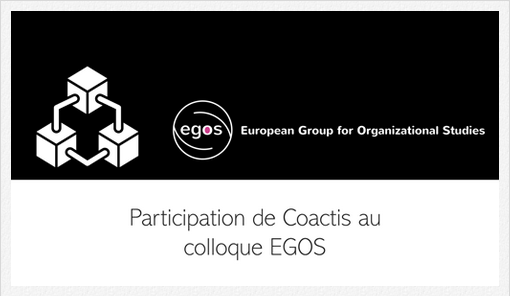COACTIS au colloque EGOS
Le colloque EGOS – European Group on Organizational Studies – a eu lieu du 8 au 10 juillet en ligne.
Organisé à Amsterdam, le colloque avait pour thème général « Organizing for an inclusive society : meanings, motivations and mechanisms ».
Plusieurs membres de Coactis ont contribué :
- Marie Fare, Isabelle Dedun et Emilie Lanciano ont présenté un papier intitulé « Inter-organisational partenrships in social innovation processes : a sociology of translation through two « all inclusive » projects » dans le RC 20 : Collaboration, coordination and cooperation accross organization
Abstract : The objective of this article is to analyse the construction process of interorganizational activities (cooperation, collaboration, coordination) that support the production of social innovations. We thus use the analytical framework of the sociology of translation or actor-network theory (Akrich et al., 2013; Callon et Latour, 1991; Callon, 1986). Based on a comparative case studies analysis, we study the stages and practices leading to the construction of the frameworks of these activities carried out between a plurality of actors (private, public and social economy actors) with divergent interests and little incentive to cooperate because of the differences in institutional logics at work. We will then return to the different moments in the construction of interorganizational relations by highlighting the role of the different actors. We finally discuss these results by highlighting first, the performative effects of the translation process and more broadly of social innovation process and second, the importance of proximity between translators to activate such process.
Keywords: social innovation, inter-organizational partnership, cooperation, coordination, translation theory
- Silvène Arnaud-Clémens et Emilie Lanciano ont présenté « Understanding organizations through the lens of care: a pragmatist approach to better take vulnerabilities into account” dans le RC 63 dédié aux approaches pragmatists dans les theories des organisations .
Abstract : This theoretical paper develops the idea of care in organizations from a pragmatist perspective and makes an analysis proposal in terms of a caring democratic inquiry. We start from the observation that the humanistic approaches of management and organizations don’t completely manage to consider people in their wholeness and to deal with their vulnerabilities, as they tend to focus on moral dispositions or to rely on implicit assumptions of overpowering individuals. To overcome this, we assume that the ethics of care, and particularly Tronto’s perspective, constitute a relevant framework to take vulnerabilities into account on a daily basis. We show the fruitful interactions of caring and pragmatist approaches and conceptualize, from Tronto’s and Dewey’s works, the phases of a caring democratic inquiry that could constitute an analytical framework to see and understand the efforts of organizations to deal with vulnerabilities. We also propose that the capacity of organizations to trigger caring democratic inquiries would make them experience and perform care over time and could then constitute in itself an alternative organizing.
Key words : care, pragmatism, alternative organizing, vulnerability, inquiry, democracy

